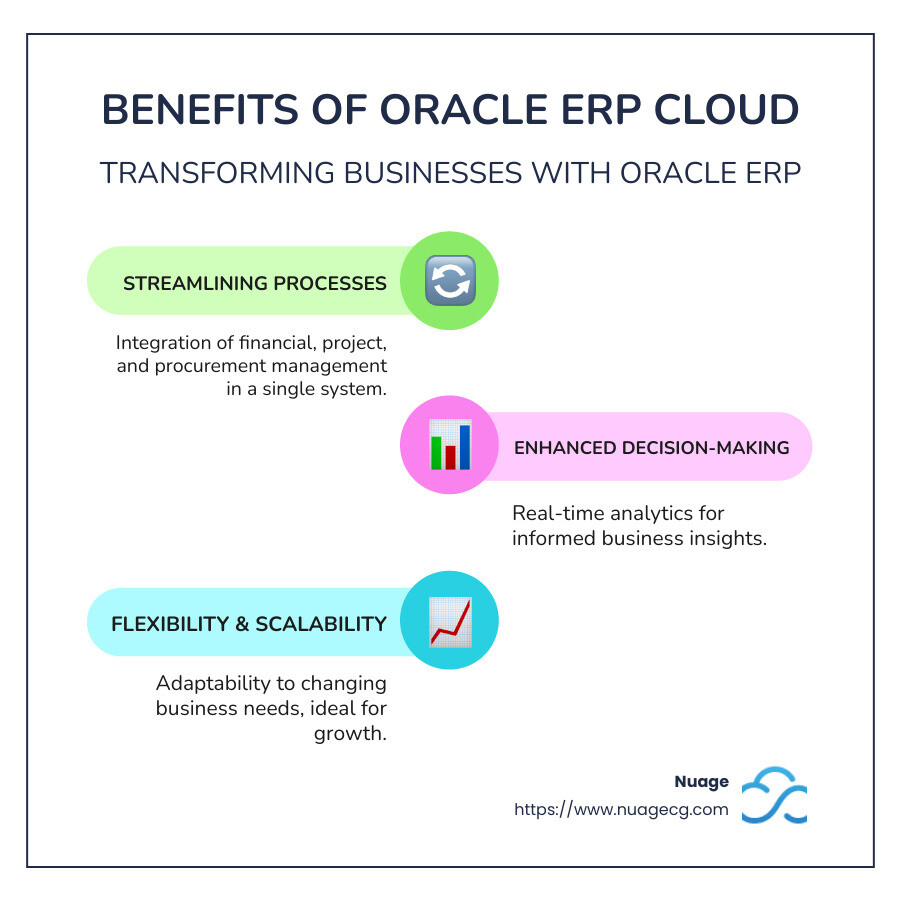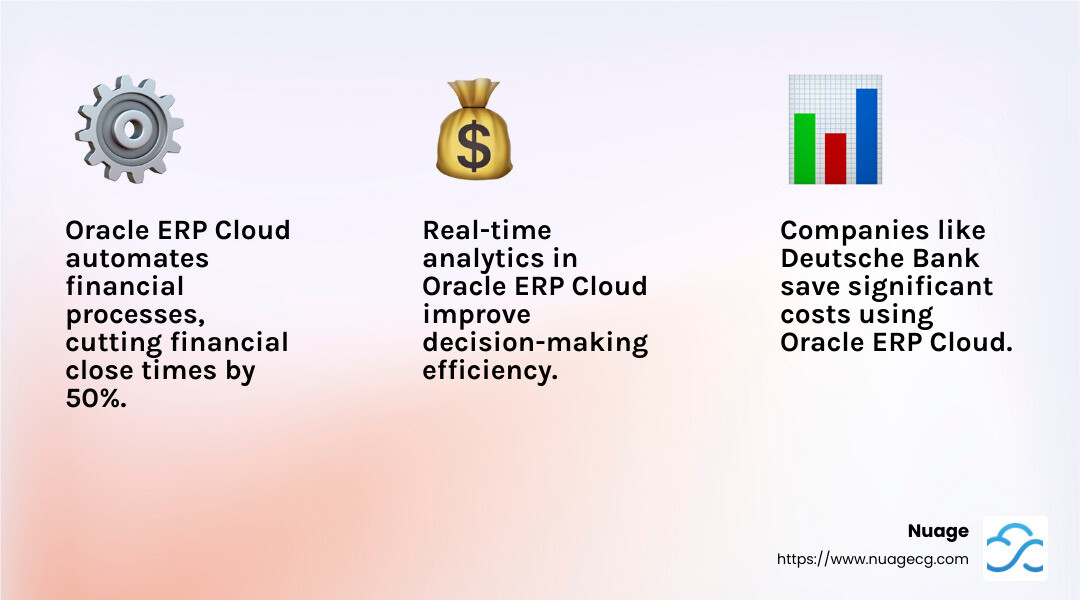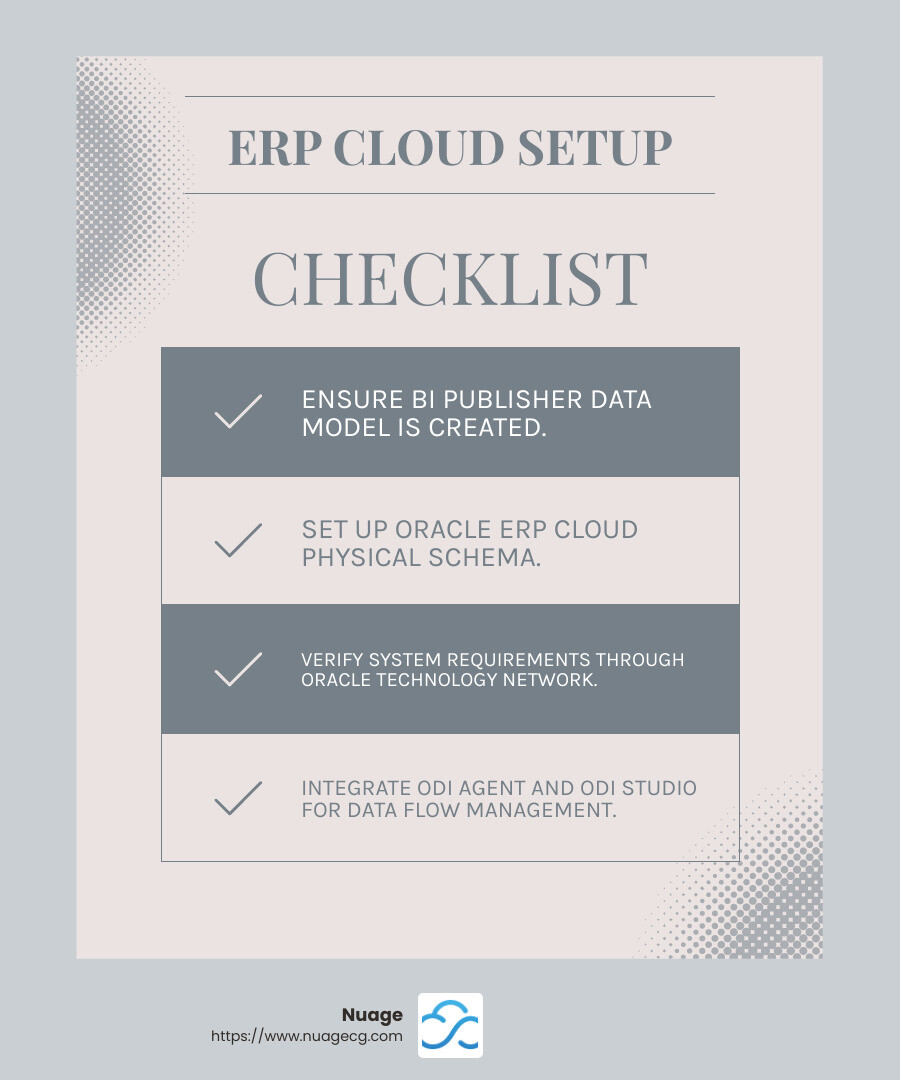Oracle enterprise resource planning cloud developer roles are crucial for businesses looking to harness digital change through advanced ERP solutions like Oracle ERP Cloud. For those seeking to understand its importance, here’s a quick overview:
- Streamlines business processes: Integrates financial management, project management, and procurement into a single cloud-based system.
- Improves decision-making: Provides real-time analytics for better business insights.
- Supports flexibility and scalability: Easily adapts to changing business needs, making it ideal for growing companies.
Oracle ERP Cloud stands out, offering powerful tools that modernize how businesses operate. At Nuage, we guide companies in their change journey, ensuring they fully leverage these innovative technologies.
I’m Louis Balla, a specialist in ERP solutions like NetSuite and . With over 15 years of experience in digital change, I’ve seen how becoming an oracle enterprise resource planning cloud developer can significantly impact a business’s growth and efficiency. Stay tuned to find out how we, at Nuage, can assist you in achieving operational excellence through Oracle ERP Cloud.

Understanding Oracle ERP Cloud
Key Features of Oracle ERP Cloud
Oracle ERP Cloud is a cloud-based ERP solution designed to help businesses automate and streamline their operations. At its core, it integrates various management processes into a single platform, making it easier to handle complex tasks. Here are some key features:
-
Financial Management: This module automates financial processes, including accounting, general ledger, and cash management. It helps businesses maintain accurate financial records and creates a holistic view of financial health.
-
Supply Chain Management: Optimizes procurement and inventory management, improving order fulfillment by 35%. This feature ensures that businesses can manage their supply chain efficiently.
-
Human Capital Management: Streamlines HR processes such as talent acquisition and payroll. It helps manage the workforce effectively, ensuring that human resources are aligned with business goals.
-
Project Management: Facilitates the management of project lifecycles, enhancing project delivery success rates by 50%. This module ensures projects are completed on time and within budget.
-
Governance, Risk, and Compliance: Helps businesses ensure compliance with regulatory requirements and manage risks effectively. It provides tools to monitor and control processes, reducing the risk of non-compliance.
Oracle ERP Cloud seamlessly integrates with other Oracle applications, creating a unified ecosystem that improves business operations.
Benefits of Oracle ERP Cloud
The benefits of adopting Oracle ERP Cloud are numerous, particularly in the context of digital change:
-
Automation: Oracle ERP Cloud automates repetitive tasks, reducing manual effort and minimizing errors. This leads to faster processes and improved accuracy across operations.
-
Streamline Processes: By integrating various management modules, Oracle ERP Cloud streamlines business processes, cutting financial close times by 50%. This integration facilitates smoother workflows and better collaboration between departments.
-
Reduce Costs: Automation and streamlined processes lead to significant cost savings. Companies have reported substantial savings by using Oracle ERP Cloud.
-
Improve Efficiency: With real-time analytics and reporting, businesses can make informed decisions quickly. This improves operational efficiency and helps in identifying areas for improvement.
-
Digital Change: Oracle ERP Cloud supports digital change by providing scalable and flexible solutions that adapt to changing business needs. This adaptability is crucial for businesses looking to stay competitive in a rapidly evolving market.
Organizations have successfully leveraged Oracle ERP Cloud to improve their operations and achieve remarkable results.
For businesses looking to explore other ERP solutions, NetSuite and offer comprehensive tools to modernize business operations, driving efficiency and growth. At Nuage, we specialize in helping businesses steer this change, ensuring they leverage these solutions to their fullest potential.

Getting Started with Oracle ERP Cloud Development
Starting on Oracle ERP Cloud development involves understanding the tools and prerequisites necessary for a seamless experience. Oracle enterprise resource planning cloud developers need to be familiar with several key components, including Oracle Data Integrator (ODI) and BI Publisher. Here’s a step-by-step guide to get started.
Prerequisites for Oracle ERP Cloud Development
Before diving into development, ensure you have these prerequisites checked off:
-
BI Publisher Data Model: Begin by creating a BI Publisher data model. This model is essential for generating reports that Oracle ERP Cloud will use. Detailed guidance is available in the Data Modeling Guide for Oracle Business Intelligence Publisher.
-
BI Publisher Report: Develop a BI Publisher report, which serves as the source of data for Oracle ERP Cloud. This report needs to be exported to the schema directory defined in the Oracle ERP Cloud physical schema.
-
Oracle ERP Cloud Physical Schema: Set up a physical schema in ODI, which includes directories for both schema and work schema. This setup is crucial for reverse-engineering and mapping processes.
Setting Up the Development Environment
Once prerequisites are in place, setting up the development environment is the next step. This involves system requirements, certifications, and integrating several components.
-
System Requirements and Certifications: Verify that your environment meets the minimum installation requirements. This includes checking system compatibility through the Oracle Technology Network.
-
Oracle Data Integrator (ODI): ODI plays a pivotal role in integrating with Oracle ERP Cloud. Developers should be familiar with its features, especially reverse-engineering and mappings, which are crucial for data integration.
-
ODI Agent and ODI Studio: These tools are vital for managing data flow between Oracle ERP Cloud and other systems. The ODI Agent requires access to the physical schema for data extraction and mapping, while ODI Studio is used for reverse-engineering.
-
BI Publisher Integration: Ensure that BI Publisher is correctly configured to produce reports in the required format, typically CSV, for seamless integration with Oracle ERP Cloud.
-
Reverse-Engineering and Mappings: ODI allows developers to reverse-engineer Oracle ERP Cloud instances, creating models and datastores that map to the physical schema. This process is essential for understanding and manipulating data structures within Oracle ERP Cloud.
By following these steps, oracle enterprise resource planning cloud developers can establish a robust foundation for development. This setup not only facilitates efficient data management but also ensures that businesses can leverage Oracle ERP Cloud to its fullest potential, streamlining operations and enhancing productivity.
For those interested in exploring other ERP solutions, consider checking out NetSuite and , which offer comprehensive tools for managing enterprise resources effectively.

In the next section, we will explore the process of creating and managing Oracle ERP Cloud instances, diving deeper into the intricacies of data servers and schemas.
Creating and Managing ERP Cloud Instances
Creating and managing ERP Cloud instances is a crucial step for developers. It involves setting up a data server and configuring physical schemas to ensure seamless data integration and management. Let’s break down these components:
Creating an ERP Cloud Data Server
To begin, you’ll need to set up a data server for your ERP Cloud instance. This server acts as a bridge between your data and the data integration tools. Here’s how to set it up:
-
User Name and Password: Start by entering a valid user name and password. These credentials are necessary for connecting to your ERP Cloud instance.
-
ERP Cloud Instance: Ensure that your data server is correctly linked to the ERP Cloud instance. This connection allows the data server to access and manage the data within the cloud environment.
Creating an ERP Cloud Physical Schema
Once your data server is ready, the next step is to establish a physical schema. This schema is essential for organizing and storing data effectively. Here’s what you need to do:
-
Schema Directory: Define the directory where your reports will be stored. This location is critical for reverse-engineering and mapping processes. Ensure that both the integration agent and studio have access to this directory.
-
Log Files and Temporary Files: Set up a work schema directory to store log files and temporary files, such as request responses. This directory is vital for monitoring and troubleshooting data processes.
-
Default Schema: If this is your first physical schema, it will automatically become the default schema for your data server. You can check the default box to confirm this setting.
Both the data server setup and the physical schema configuration are essential for ERP cloud developers. These steps ensure that data flows smoothly between ERP Cloud and other systems, enabling efficient data management and integration.
In the upcoming section, we will dig into designing and implementing mappings, exploring how to use ERP Cloud as a source for data integration tasks.
Designing and Implementing Mappings
Loading Data from Oracle ERP Cloud
For oracle enterprise resource planning cloud developers, a crucial task is designing and implementing mappings to load data efficiently. Oracle ERP Cloud serves as a robust source for these mappings, enabling developers to extract and transform data seamlessly.
Mapping and Loading Knowledge Modules (KMs)
Mapping in Oracle Data Integrator (ODI) involves using Loading Knowledge Modules (LKMs) to move data from Oracle ERP Cloud to a target or staging area. These modules are essential for performance optimization.
-
LKM Oracle ERP Cloud to SQL: This module is used when loading data into a SQL staging table. It extracts data from a BI Publisher report, which must be in CSV format. The LKM waits for the BI Publisher job to complete before loading data, ensuring accuracy and completeness.
-
LKM Oracle ERP Cloud to File Direct: This module is ideal for exporting data directly to a file. Like the SQL module, it handles data in CSV format and ensures the BI Publisher job is completed before proceeding.
BI Publisher Report and Staging Table
The BI Publisher report is central to the data extraction process. It defines the data to be extracted from Oracle ERP Cloud. Once extracted, the data is inserted into a staging table or file, depending on the chosen LKM.
-
Ensure your BI Publisher report is well-defined and outputs data in CSV format.
-
Use the staging table as an intermediary storage space before data is loaded into the final target system.
Remote Agent Configuration
For developers working with distributed environments, configuring a remote agent can improve performance and flexibility.
-
Remote Agent Setup: Set up a physical and logical agent to facilitate data extraction processes remotely. This can be particularly useful for handling large data volumes or when network latency is a concern.
-
Configuration File: Modify the configuration file (
instance.cmdorinstance.sh) to ensure no proxy interference during data extraction.
By leveraging these tools and techniques, developers can efficiently load and manage data, ensuring that Oracle ERP Cloud serves as a reliable source in the data integration process. For more information on ERP solutions, you can explore NetSuite and , which offer comprehensive ERP capabilities.
In the next section, we’ll address some frequently asked questions about Oracle ERP Cloud development, providing further insights into this powerful tool.
Frequently Asked Questions about Cloud ERP Development
What does Cloud ERP do?
Cloud ERP is a comprehensive suite of applications designed to help businesses manage their core operations. It covers various functions like accounting, financial management, project management, and procurement. Each module is crafted to streamline processes, automate tasks, and improve efficiency across the organization.
-
Accounting and Financial Management: These modules help businesses manage their financial transactions, reporting, and compliance efficiently. They support multiple currencies and accounting standards, making them ideal for global operations.
-
Project Management: This feature allows businesses to plan, execute, and monitor projects effectively. It integrates with financial data to ensure projects are on budget and on schedule.
-
Procurement: Cloud ERP simplifies the procurement process, from requisition to payment, helping companies reduce costs and manage supplier relationships better.
What is the difference between ERP and EPM in Cloud?
While both ERP and EPM are crucial for business operations, they serve different purposes. ERP (Enterprise Resource Planning) is primarily focused on operating the business. It manages day-to-day activities like accounting, procurement, and project management.
On the other hand, EPM (Enterprise Performance Management) is about managing the business. It involves analyzing and reporting on financial performance, budgeting, and forecasting. EPM helps organizations evaluate their performance and plan strategically for the future.
What is EPM cloud planning?
EPM cloud planning is about enhancing a business’s financial performance through strategic planning and analysis. It encompasses:
-
Budgeting and Forecasting: EPM cloud tools help businesses create accurate budgets and forecasts, allowing for better financial planning and resource allocation.
-
Financial Reporting and Analytics: These tools provide detailed insights into financial data, helping businesses make informed decisions. They enable organizations to analyze trends, measure performance, and identify areas for improvement.
By leveraging EPM Cloud, businesses can align their financial strategies with their operational goals, ensuring a cohesive approach to growth and efficiency.
For more information on how Cloud ERP solutions can transform your business, explore our NetSuite page and page. These platforms offer robust tools to drive digital change and enhance operational efficiency.
In the next section, we’ll dive deeper into Cloud ERP’s capabilities, exploring how developers can harness its potential to drive digital change.
Conclusion
At Nuage, we understand that digital change is not just about adopting new technology—it’s about transforming the way businesses operate. With over 20 years of experience in the ERP space, we have witnessed how powerful ERP solutions like Oracle ERP Cloud, , and NetSuite can be in driving business change.
Our commitment to helping businesses steer this digital change is unwavering. We provide custom solutions that fit your unique needs, ensuring you harness the full potential of your ERP systems. Whether it’s streamlining processes, reducing costs, or enhancing efficiency, we stand by you every step of the way.
Oracle ERP Cloud is a robust tool that offers a comprehensive suite of applications designed to manage core business operations. By integrating it with our expertise, your organization can achieve seamless automation and improved performance. If you’re ready to explore how Oracle ERP Cloud can propel your business forward, we invite you to learn more about our NetSuite offerings.
In the rapidly evolving world of ERP, staying ahead means embracing change. With solutions like and NetSuite, and our dedication to your success, we help your business not just survive but thrive. Together, let’s start on this journey of digital change and achieve more with less.
